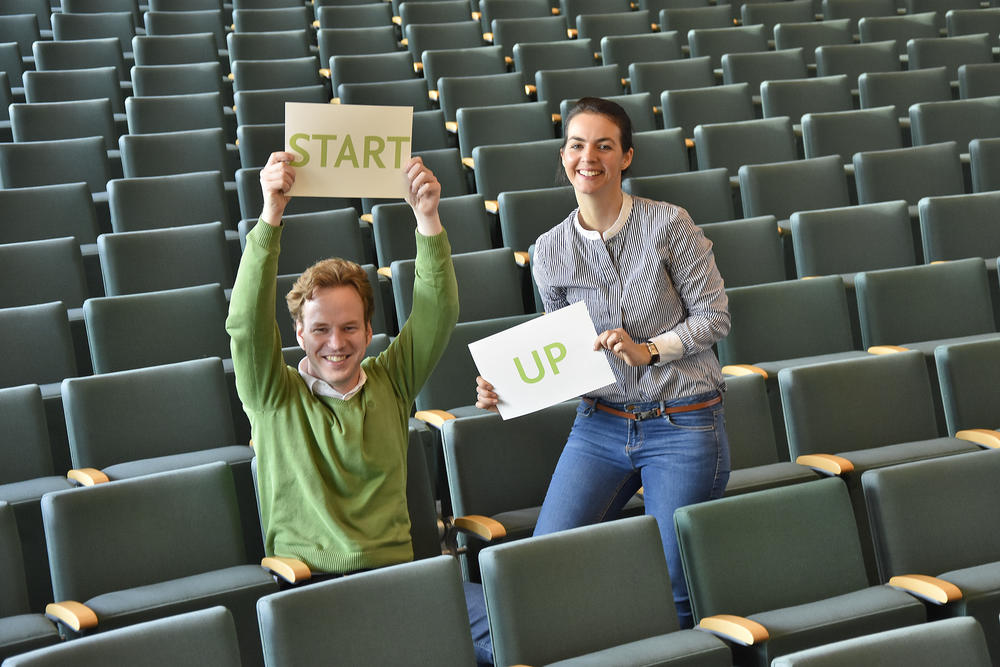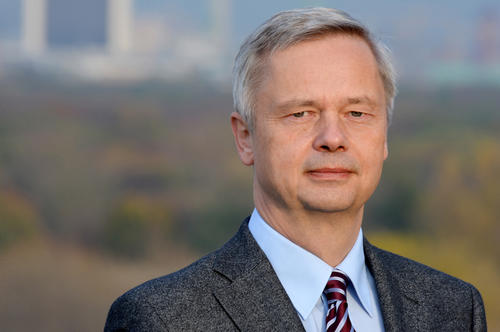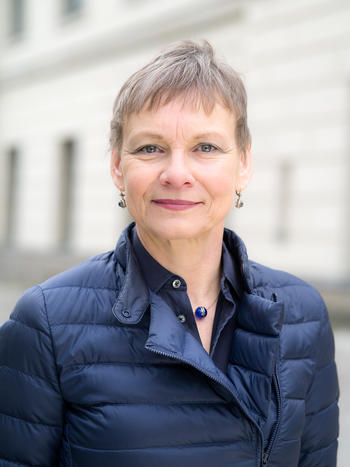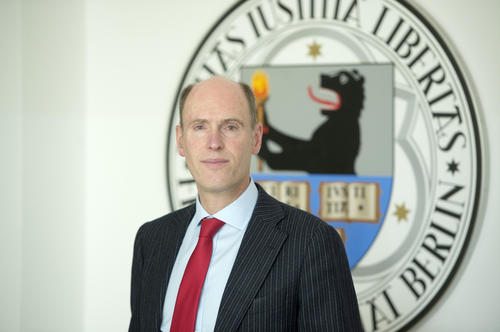Helping Shape the Future of Berlin
How might the science-business partnership be made still better? What role could the Excellence Strategy play in this regard? An interview with the presidents of the three major Berlin universities.
Dec 12, 2017
Hochkarätige Ausgründungen werden von den drei Universitäten aktiv gefördert und sind ein wichtiger Faktor für die Entwicklung des Wirtschaftsstandorts Berlin.
Image Credit: Carolin Schmidt
Support for start-ups is gaining an ever higher profile at the Berlin universities. Joint academic and business projects such as the Einstein Center Digital Future are taking off. A conversation on the opportunities that a shared strategy in this area might offer – with Professor Sabine Kunst, the president of Humboldt-Universität, Professor Peter-André Alt, the president of Freie Universität, and Professor Christian Thomsen, the president of Technische Universität.
What stimuli do the universities provide for Berlin as a business location?
Christian Thomsen: There is no question but that the universities are strong motors of Berlin as a business center. They are an important economic factor for the city, both as employers and because of their demand for external services, capital goods, and other operational resources. They generate revenues of over 1.7 billion euros in the region, and taxes on this income provide over 120 million euros for the city. Besides that, the universities finance more than a quarter of their budget through third-party funds and link roughly 100,000 students to the city, whose needs give a further boost to the regional economy. As a comparison, the state of Berlin provides the universities with 1.18 billion euros in state subsidies.
Sabine Kunst: Another element is the way commerce in our metropolitan region is influenced through the universities and the transfer of knowledge and innovation. Shared research projects and commissioned research in particular give momentum to the transfer of ideas, innovation, and know-how, and this strengthens the competitiveness of existing Berlin companies. Add to this the spin-offs established by universities and departments, which rejuvenate the Berlin entrepreneurial landscape.
Peter-André Alt: It is vital to support a start-up culture based on academic insights. Over recent years, this culture has increasingly set the tone for Berlin as a location. Without the universities, new enterprises would be less substantial: we know that start-ups emerging from academic bases are more likely to provide sustained quality.
Prof. Christian Thomsen is the president of Technische Universität Berlin.
Image Credit: David Ausserhofer
How has the status of start-up support evolved for universities in the past 10 years?
Alt: The Berlin universities have built and consolidated a raft of services for new enterprise over this period. We offer rooms, laboratories, consultancy and training courses, and have a good record when it comes to obtaining finance for start-up projects. And a difference is being felt: sixty-nine percent of university-related start-ups in the Berlin metropolitan region were founded in the last decade, and 45 percent since 2011.
Companies like Humedics GmbH show that all the effort is worthwhile. The medical technology firm was founded in 2009 by scientists at Freie Universität and Charité. A few days ago, it was granted market approval, after a long phase of development.
Thomsen: The significance of venture activities at our university has developed at a steady pace, as have the third-party funds we have won. Technische Universität Berlin has contacts to more than 1,200 start-up founders from our ranks. We are responsible for 30 start-up projects every year. Together with other Berlin higher education institutions, we conducted a survey of over 600 spin-off enterprises. We found out that they created more than 22,000 jobs and achieved a turnover of three billion euros. Roughly 85 percent of these firms are based in Berlin and Brandenburg. This is a clear indication of an economic strength whose springboard is the universities and colleges.
Kunst: We can now say that support for start-ups at Humboldt Universität zu Berlin is given high priority, and additionally enjoys definite political support and public subsidy programs such as the “Transferbonus” scheme.
Our two venture zones at Campus Adlershof and Campus Mitte provide office space for a total of around 100 founders. You cannot escape the concentrated spirit of enterprise emanating from the start-up and spin-off activity here. Over 80 percent of the new enterprises we have engendered are still active in the market five years further down the line. And what is especially pleasing is that the breadth of company fields, from greateyes in physics, through Smarterials in chemistry to Emolyzr representing psychology, reflects the entire research spectrum.
In what ways have the successes of the Berlin universities in the Excellence Initiative competition influenced relations between academia and business?
Kunst: Excellence in research is the precondition for superlative innovation. And innovation strengthens interest from business in the idea of cooperation with universities and leads to high-value start-ups. Berlin universities reinforced this mechanism under the Excellence Initiative and created as many points of contact between academia and business as it was in our power to do.
An example of this is the concept of Humboldt venture workshops. These were set up with the grant supplied by IHK Berlin, with the aim of showing scholars and scientists – including master’s students – how research findings can be turned into marketable innovations. The acquired knowledge is then applied to the current issues facing Berlin companies in Transfer Labs, and used to develop innovative solutions.
Thomsen: Our UniCat Cluster of Excellence works with chemical catalysis. It has produced not only innovative ideas and publications, but also new ideas for a start-up scene in the field of green chemistry. We are building a dedicated venture zone for these young companies at our campus. We strongly believe that from these activities, a new era of start-ups in sustainable chemistry can take shape. This would be a huge boost for the reputation of Berlin.
Alt: One must also say, however, that the positive effects of the Excellence Initiative on relations between academia and business are less pronounced than originally expected. Businesses conduct program research, universities pure research. Despite the public questioning of this divide, these are very different research systems that do not mesh readily. The best we can do is to bring the cultures closer to each other where a project is jointly funded. Einstein Center Digital Future is an example of Berlin companies providing the finance for junior professorships for research in digital areas.
What opportunities do you see for Berlin as a business location in the planned joint application by Freie Universität, Humboldt Universität, Technische Universität, and Charité-Universitätsmedizin Berlin in the new Excellence Strategy competition?
Alt: It will be easier to convince business to cooperate with us because the spectrum of disciplines we cover will be still more impressive and diverse than that afforded by a single Berlin university. The transfer area – that is, for connection points for applied research – will for that reason play an increasingly visible role.
Kunst: Yes, as an alliance of universities there is a great opportunity to create a common transfer system for cutting-edge research topics, with an impact beyond Berlin, too. It won’t be without a struggle for both sides. The capacity of regional business to take up academic findings will have to increase, just as the universities will have to become more sensitive to scientific interest from practice.
Thomsen: Our cooperation allows us to approach our core projects in an even more strategic way – which gives us and our partners a great advantage.
What are your wishes when it comes to future cooperation between enterprise and academia?
Thomsen: Professor Alt already mentioned the Einstein Center Digital Future, which we managed to set up in a very short time. The project has attracted funds of around 38.5 million euros and international acclaim. Most of the funds come from business. So from a scientific base, we have instigated an initiative in the field of digitalization that will be extremely beneficial to Berlin and beyond. It was a timely pulling together with business, and we managed to overcome bureaucratic hurdles in record time. This could be a model for other topics of relevance to business.
Kunst: What I would like is for the alliance to forge a completely new base for research-related cooperation between academic institutions and business. Alliance partners will set up a kind of cooperation platform, which can be used flexibly by universities, nonuniversity institutions, and companies active in research for shared research projects. Such a platform would have the potential to advance both science and business in the Berlin region. I would also extend an invitation to the State of Berlin to continue to use its powers to promote collaboration between large companies, start-ups, and research.
Alt: My particular wish is for mutual curiosity and openness, more work contacts and exchange, and more understanding for pure research on the part of business. And: the creation of, rather than reduction in, work places in technology-relevant companies in Berlin.
Further Information
IHK-Pudiumsdiskussion "Exzellente Wissenschaft für Berlin - Potenziale bündeln"
Ort: Konferenzzentrum des Ludwig Erhard Hauses, Fasanenstraße 85, 10623 Berlin
Zeit: 17:00 Uhr bis 19:30 Uhr




